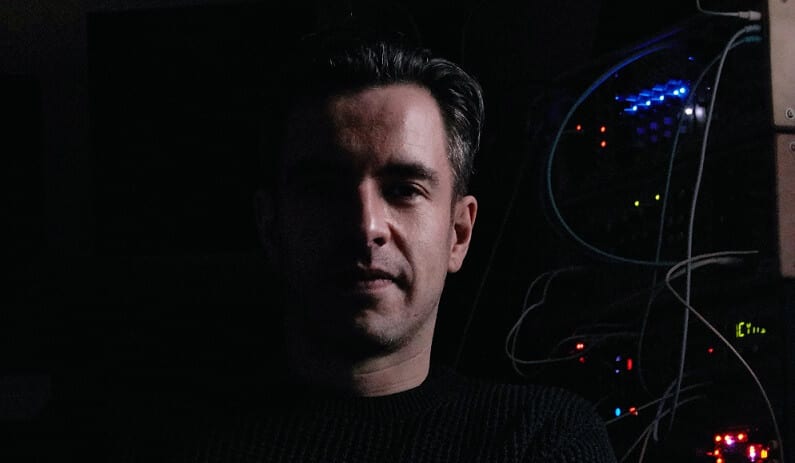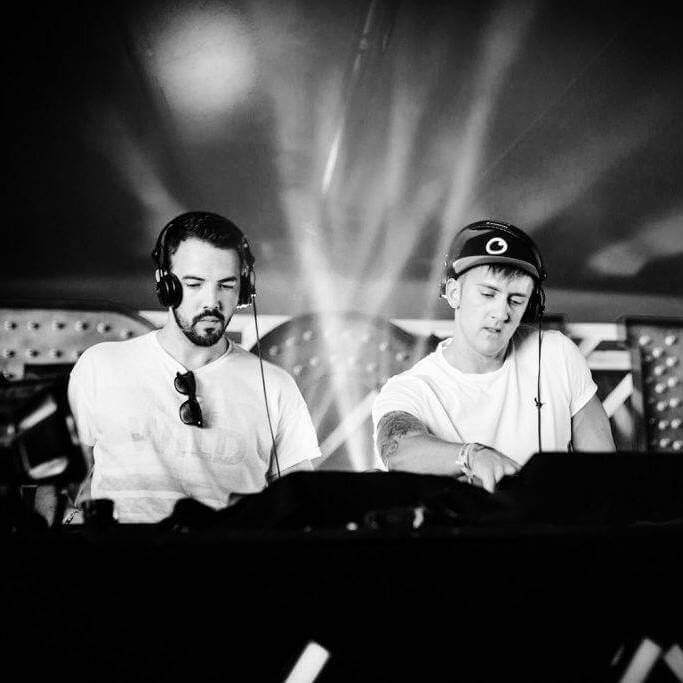Photography: JJ Dear
If you’ve been following the futuristic fusion of labels such as Astrophonica, Cosmic Bridge and Exit then you’ll already know exactly who the hell Lewis James is.
A prominent figure in the exciting halftime/jungle/beat pastures around the 160-170 axis, the Irishman-in-London has spent the last few years developing a sterling body of work that ranges from the fastlane furore of Ferro to the industrial strength gun-finger-snapping halftime of Turbo via the smouldering 24th century soul of his latest cut Praying Out Loud, an evocative halftime cut featuring the urgent, almost gospel-like vocals of frequent collaborator Dandans K and a killer remix from Om Unit.
There’s a whole tonne more of this unique and unpredictable fusion to follow. Dig into his past accomplishments and background and you’ll find tonnes more, in a whole array of places including various films and some of the biggest games in recent years. Digging deep into the dark art of Foley and sound design, Lewis has been deep into the craft since 2005 and has even taught himself a variety of instruments – including guitar, bass, piano and drums – in order to record his own samples.
While his body of work as Lewis James is still very much in its burgeoning phases, his skills, sonic palette, knowledge and vision have been galvanised for well over a decade. An erstwhile turntablist with even more years of collecting and immersion to his name, Lewis’s DJ sets (like this one for example) are rifled with untold reference points. This man knows his music, knows his theory and knows exactly what he’s up to. Now it’s time for you to get to know him…
You cover a very broad sound. From pretty unruly jungle influenced stuff to soulful, deeper cuts like Praying Out Loud. But no matter how broad that range is, there’s still a very clear theme and style running through it all.
Thanks. I’m always fascinated by people who have a personality-based sound. That’s the most fascinating thing. The way people do things and it sounds like them no matter what they do. It’s like handwriting. No one can copy your handwriting no matter how hard they try. So I do try my best to develop that as hard as I can. If I play the same thing over and over and I don’t like it then what can I do to improve it? I’m not going to play Chopin or Schubert or suddenly turn around and make a Maroon Five record. I can only make what sounds like me and I have to harness that for what it’s worth.
Having said that, I do a lot of sound design stuff, brief work and music for picture which has to sound a certain way. But with my own music I might as well be making beats for someone else if I don’t make it sound like me. And that makes me confident about the messages I want to express. I’ve got to be at certain place in my own craft to do that.
And in a certain place in your own mind. So you can battle that inner critic devil?
I pay close attention to that guy. Over the years we’ve come to an agreement about how to get on. He’s active at the early stages and very quick to knock down ideas that are a house of cards and won’t stand up over time. I make something which I think is okay and the inner voice is like ‘I’m not even listening mate, you do what you do and I’ll check back in when it gets good again’ When I’ve lost the interest of that guy the whole thing is pointless so I interact with that voice and get him on board. When that part of me thinks it’s good then it gets finished and it comes out. It could just be a hi hat, a kick and a synth but if that guy likes it then we’re locked in.
Can you tell us about the other side of your musical life? The game scoring side…
I don’t want to ride the coat tails of it so I have to stress that they are very separate roles. But I have a lot of games with scores and sound design since 2005. I did three Burnout games in a row, I worked on Need For Speed Carbon, Army Of Two: The 40th Day, Kill Zone Shadow Fall, Horizon Zero Down and a few more. It’s been a really interesting side to what I do.
Have you used something from a game job for a tune or vice versa?
Recording techniques and ways of getting sounds are similar. Especially as a lot of sound design I make uses a musical approach and I always try and make something musical out of whatever I’m recording. So I’d never mix the content, ever, but in terms of the ideas and framework they have a lot to offer each other. There’s a lot of real world sounds that can be musical. Have you ever heard what happenes when you put metal on dry ice?
No
<plays a noise that sounds like the opening of hell>
Blimey that’s amazing
It’s because of the temperature of the metal reacting with the ice. Different kinds of metal, different shapes all do different sounds. I recorded that a few years ago and it’s at the start of my track Turbo. It’s part of Foley sound and has been used for film, TV and theatre since the early days. They’d have used tricks like that for old Loony Tunes cartoons, built ‘instruments’ to make those sound and write them into the score. So because of working in studios I’ve learnt this.
Foley is amazing isn’t it?
Foley is the grandfather of sound design, mate. If you can understand that then you can have a good chance of being a sound designer. There are so many tricks you think wouldn’t make a great sound but actually does.
Do you come from sampling, too? I know you learnt to play various instruments so you could sample yourself, right?
Yeah I never felt comfortable with sampling a loop off a record. I find it totally unsatisfying. As a listener, sure, it’s amazing. I don’t find it disrespectful, I just don’t want to do it. Although I do sample breaks. Even if it’s just the hi-hat of a think break. A lot of people doing that now; an 808 kick, a think break hi-hat and dubby noises. That’s it. Moresounds does it and he’s phenomenal. He creates this incredible jungle sound without actually using that many breaks.
Do you analyse everything you hear or can you switch off the inner critical listener?
If you want to stay sane in this business then you have to switch critical listening off. When I started doing sound design I couldn’t go to the cinema because I’d hear a sound effect and know which sound effect CD it came from. I was deconstructing things far too much so I tried to listen as a fan and a normal listener. The issue is when I’m sitting there and I’m hearing it and it sounds dead obvious. It breaks the illusion. I also want the art I like to be a mystery. I don’t want to know how it’s done, it ruins it.
You’re trying to create that mystery for others. But do you ever create that mystery for yourself?
Yeah sure. Sometimes when I’m experimenting with different effects pedals and amps and various instruments. But that’s experimenting. It’s the main part of the process and has to be. If you go into the studio just to make a big track and you only go by what you already know then you’ll miss half the fun. You want to be in this almost child like state of play. When you’re in that zone you’re likely to find a lot of things you had no idea existed…
Lewis James – Praying Out Loud is out now
Lewis James exists: Facebook / Soundcloud / Twitter / Bandcamp
<socials>


